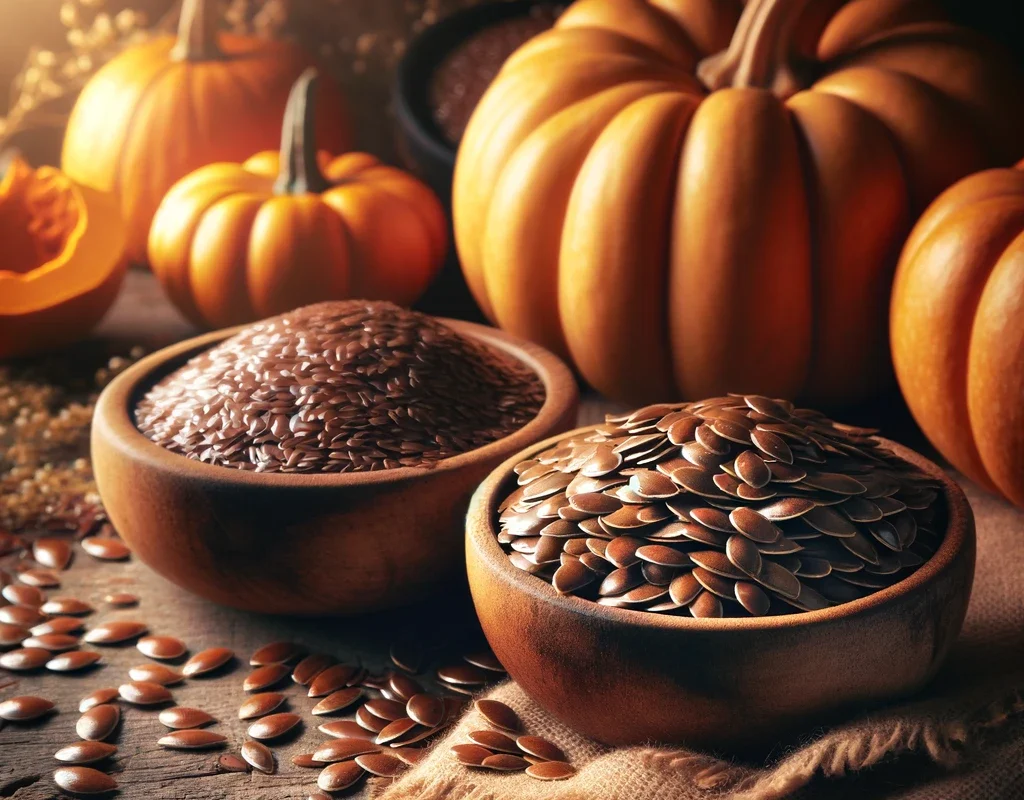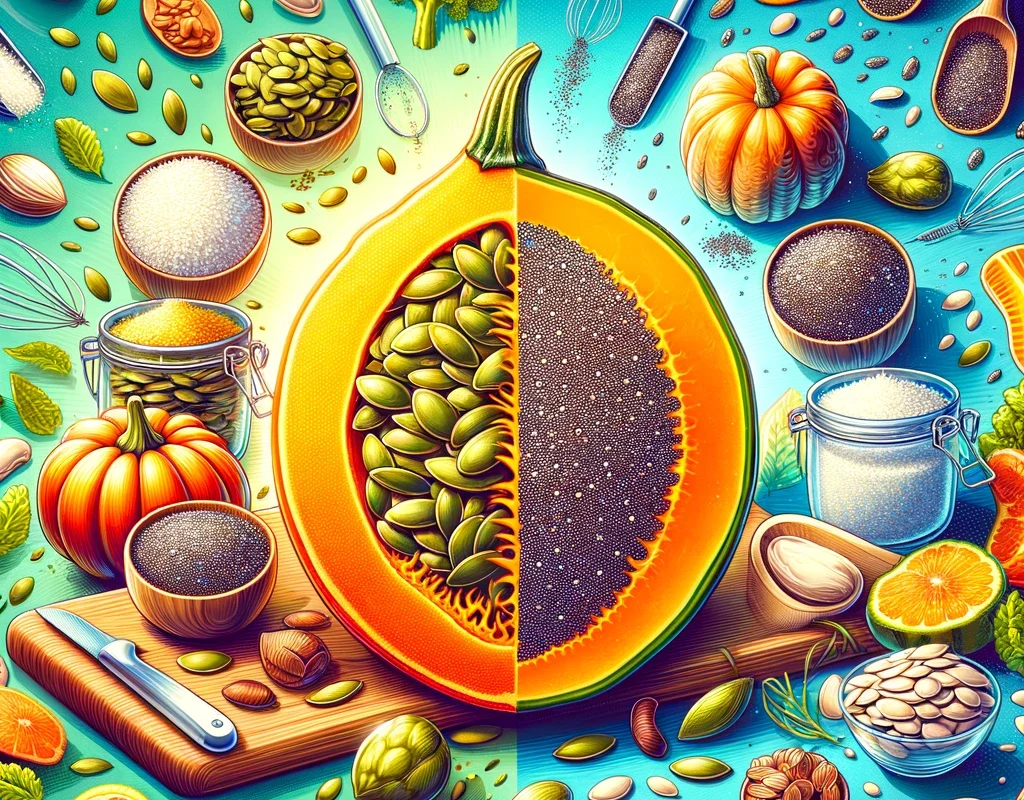Within the diverse world of nutrient-rich foods, seeds hold an esteemed position for their dense nutritional benefits and their flexibility in various culinary creations. Pumpkin seeds and poppy seeds, in particular, have gained popularity for their distinct health advantages and nutrient profiles. This article aims to shed light on these two seed varieties, comparing their nutritional content, exploring their health benefits, and suggesting ways to incorporate them into your daily diet, guiding readers towards making healthier dietary choices.
Nutritional Profiles Explored
Both pumpkin seeds and poppy seeds are celebrated for their impressive nutrient density, offering a variety of essential vitamins, minerals, and other beneficial compounds. Pumpkin seeds are a treasure trove of magnesium, a mineral vital for numerous bodily functions including heart rhythm, bone health, and blood pressure regulation. They’re also a great source of zinc, which is crucial for immune function, and antioxidants that combat cellular damage. Additionally, these seeds are packed with healthy fats, specifically omega-6 fatty acids, which are beneficial for heart health and inflammation reduction.
Poppy seeds, on the other hand, boast a significant calcium and phosphorus content, supporting bone health and repair. They are also high in dietary fiber, aiding in digestive health and promoting a feeling of fullness. Poppy seeds contain linoleic acid, an essential fatty acid important for brain health and cell growth. With their rich iron content, they assist in energy production and efficient oxygen transport throughout the body, showcasing their small but mighty nutritional impact.
Understanding the unique nutritional benefits of each seed type allows individuals to tailor their diets to specific health goals, whether it’s enhancing bone strength, boosting immune function, or supporting heart health, making both pumpkin and poppy seeds invaluable dietary additions.
Unveiling the Health Benefits
Investigating further into the health advantages, the consumption of pumpkin and poppy seeds can significantly contribute to one’s well-being. The magnesium in pumpkin seeds is linked to heart health improvements, including better blood pressure control and a lowered risk of heart-related conditions. Their tryptophan content is beneficial for sleep regulation, promoting restful nights through the production of serotonin and melatonin. For men, the zinc in pumpkin seeds is especially advantageous for maintaining prostate health.
Poppy seeds offer distinct health benefits, including pain relief and digestive support, thanks to their analgesic and fiber-rich properties. Their antioxidant content fights against oxidative stress, reducing the risk of chronic disease. These seeds have also been found to support mental health, aiding in the management of depression and anxiety through their nutrient-rich composition.
Incorporating these seeds into one’s diet not only supports physical health but also enhances mental and emotional well-being, highlighting the comprehensive benefits of pumpkin and poppy seeds.
Culinary Applications and Suggestions
The culinary versatility of pumpkin and poppy seeds enhances their appeal, offering delicious and nutritious ways to enrich one’s diet. Pumpkin seeds, with their crunchy texture and nutty flavor, are perfect for adding to salads, yogurts, and baked goods. They can be roasted as a healthy snack or used as a flavorful addition to soups and stews. Their versatility extends to both sweet and savory dishes, providing a nutritional boost and enhanced flavor to a variety of recipes.
Poppy seeds, known for their unique, slightly sweet taste, are a favorite in baked items, dressings, and as a textural topping on dishes. Their global culinary presence ranges from Eastern European poppy seed rolls to American lemon poppy seed muffins, illustrating their widespread appeal.
Experimenting with pumpkin and poppy seeds in the kitchen not only elevates the nutritional content of meals but also introduces new flavors and textures, making them a nutritious and flavorful addition to any meal plan.
In summary, the comparison between pumpkin seeds and poppy seeds reveals their distinct nutritional advantages, health benefits, and culinary uses. By incorporating these seeds into your diet, you can harness their nutritional power, contributing to a healthier and more flavorful culinary experience. Whether for health improvement or culinary exploration, pumpkin and poppy seeds stand out as nutritional champions in any diet.
Cost and Accessibility
Navigating the aisles of health food stores or browsing online markets reveals that both pumpkin seeds and poppy seeds are readily available, albeit at varying price points and in different forms. Pumpkin seeds, often available both shelled and unshelled, can be found raw, roasted, or seasoned, offering a range of options for consumers. Their cost varies based on organic certification, brand, and purchasing format (bulk vs. packaged), but generally, they are considered an affordable nutritional investment, especially given their versatility and health benefits.
Poppy seeds, while slightly less common than pumpkin seeds, are nonetheless accessible in most grocery stores, specialty food shops, and online. They are typically sold in small quantities, reflecting their common use as a spice or garnish rather than a bulk food item. Price-wise, poppy seeds can be more expensive per ounce than pumpkin seeds, largely due to their extensive cultivation and harvesting process. However, given their potent flavor and nutritional profile, a little goes a long way, making them a cost-effective addition to many recipes.
Understanding the cost and accessibility of these seeds can help consumers make informed decisions about incorporating them into their diets. Whether opting for bulk purchases of pumpkin seeds to save money or splurging on a small packet of poppy seeds for a special recipe, both seeds offer nutritional value that outweighs their cost.
FAQs
Can you substitute one for the other in recipes?
While pumpkin seeds and poppy seeds differ in taste and texture, creative substitutions can be made depending on the recipe. For instance, in baking, poppy seeds might be replaced with finely ground pumpkin seeds for a nutty flavor, although the characteristic appearance of poppy seeds will be lost. It’s important to consider the flavor profile and desired texture of the dish before making substitutions.
Are there any allergic reactions to be aware of?
Like all foods, pumpkin seeds and poppy seeds can cause allergic reactions in some individuals. Those with known allergies to seeds should exercise caution and consult healthcare providers before introducing new seeds into their diet. Allergic reactions can range from mild to severe, so awareness and caution are key.
How should these seeds be stored?
To maintain their freshness and nutritional value, both pumpkin and poppy seeds should be stored in airtight containers in a cool, dark place. Refrigeration can extend their shelf life, especially for pumpkin seeds, which contain higher amounts of unsaturated fats and can become rancid if stored improperly.
Conclusion
Pumpkin seeds and poppy seeds each offer unique nutritional benefits, culinary uses, and flavors that can enhance a variety of dishes. While distinct in their properties, both seeds are valuable additions to a health-conscious diet, contributing to overall well-being with their rich nutrient profiles. Whether used in traditional recipes or as innovative additions to modern dishes, these seeds can elevate the nutritional value and taste of meals, making them worthwhile staples in any kitchen.
As we’ve explored the myriad aspects of pumpkin and poppy seeds, it’s clear that both have their place in a balanced diet. From their health benefits to their culinary versatility, these seeds offer something for everyone. By making informed choices about how to incorporate them into meals, consumers can enjoy the rich flavors and health benefits these seeds have to offer.




